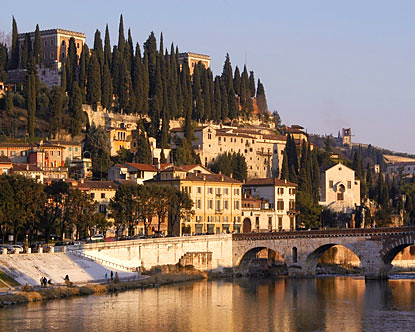Verona is the romantic city in northern Italy, quite possibly best known as being the source of inspiration for Shakespeare's Romeo and Juliet, The Taming of the Shrew (if in a small way) and The Two Gentlemen of Verona. And while Romeo and Juliet are constantly in use as baby names in America, Verona was used only 29 times in 2011. It ranked from 1880 to 1934, most popular in 1905 and 1906 (when many names containing the letter V were popular), falling off the charts every so often. The meaning of Verona is contested. It could be from the Greek name Veronica, meaning "victory bringer," which would make it just a little bit place name-y. One legend has it that Verona was named for King Theodoric's castle. There are many tales of battle and power connected to Verona since it was an intersection of many cities - when Verona was just forming as a city, several leaders fought on the land and it exchanged hands quite a bit.
Today Verona is a nice tourist attraction, where visitors can find festivals, art (Leonardo da Vinci called it home), music, and operas. The Verona Arena, built by the ancient Romans, is definitely a main stop, and the city's medieval architecture is beautiful. It's a great historical place to name a kid after (bonus if you have sentimental/family ties to the city) and much more sophisticated and historically rich than other place names, such as Dallas, Dakota or Brooklyn. Take it from St. Peter Martyr.
Nicknames can go either way - the feminine Vera, or the tomboy Ronnie. Since I probably won't be covering any more Italian cities-as-names starting with V, at least for a long time, I'll tell you there were 6 baby girls named Venezia, 30 Venice, and 8 Venecia.

Verona is beautiful name. Here is popularity graph since 1930.
ReplyDeletehttp://www.babynology.com/rank-verona-f1.html
I've liked Verona since reading Romeo and Juliet when I was 16. I love the first lines of the play:
ReplyDelete'Two households, both alike in dignity,
In fair Verona, where we lay our scene,
From ancient grudge break to new mutiny,
Where civil blood makes civil hands unclean'